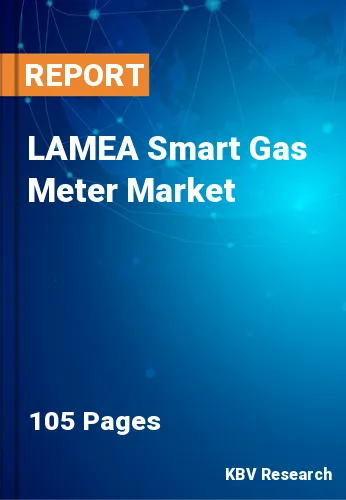
The Latin America, Middle East and Africa Smart Gas Meter Market would witness market growth of 4.9% CAGR during the forecast period (2021-2027). Smart grids are emerging technologies that have digitalized gas networks by offering utilities and consumers with the data for effective management of gas usage.
Energy utilities across the world are putting massive investments in smart grid technologies that allow automatic monitoring and regulating of gas consumption, development of new business models, and cut down outages & reduce response time at the time of natural calamities. At the end-use level, smart grids are able to allow demand flexibility and consumer participation in the energy system operation with the help of distributed generation and storage. By installing smart meters, companies can provide reliable energy and new efficiency products according to the demand from customers.
Baltimore Gas and Electric Company’s (BGE) Smart Grid Initiative comprised a nationwide installation of advanced metering infrastructure (AMI). The utility installed a customer web portal and home energy management reports, which assist in offering customers with the behavioral science-based representation of the utilization information to motivate home energy efficiency and conservation. A recently deployed customer care and billing system and meter data management system (MDMS) allow optimal utilization of the latest technologies.
Operational benefits like constantly monitoring pipelines, accessibility of real-time data, accuracy in operation, eliminating the need of noting meter reading manually will boost the adoption of smart gas metering. Moreover, the market growth is supported by the cost savings combined with the one-time investment in the smart meter. Combined with the benefits offered to the gas utilities, the smart gas meter has also specific advantages for customers that involve adjusting the user to control the monthly bills, comprehensive feedback in terms of energy usage, and decreases the number of system failures. These aspects would help the smart gas meter market to expand further during the forecast period.
The Residential market dominated the South Africa Smart Gas Meter Market by End User 2020, thereby, achieving a market value of $15.7 million by 2027, growing at a CAGR of 5.2 % during the forecast period. The Commercial market is expected to witness a CAGR of 6.1% during (2021 - 2027).
Based on Type, the market is segmented into Smart Diaphragm Gas Meter and Smart Ultrasonic Gas Meter. Based on Technology, the market is segmented into Automated Meter Reading (AMR) and Advanced Metering Infrastructure (AMI). Based on Component, the market is segmented into Hardware and Software. Based on End User, the market is segmented into Residential, Commercial and Industrial. Based on countries, the market is segmented into Brazil, Argentina, UAE, Saudi Arabia, South Africa, Nigeria, and Rest of LAMEA.
Free Valuable Insights: The Global Smart Gas Meter Market is Predict to reach $2.8 Billion by 2027, at a CAGR of 4.7%
The market research report covers the analysis of key stake holders of the market. Key companies profiled in the report include Honeywell International, Inc., Fujitsu Limited, Xylem, Inc. (Sensus), Landis+Gyr Group AG, Itron, Inc., Apator S.A., Diehl Stiftung & Co. KG, Wasion Group (Star Treasure Investments Holdings Limited), Arad Group, and Hubbell, Inc.
By Type
By Technology
By Component
By End User
By Country
Our team of dedicated experts can provide you with attractive expansion opportunities for your business.
